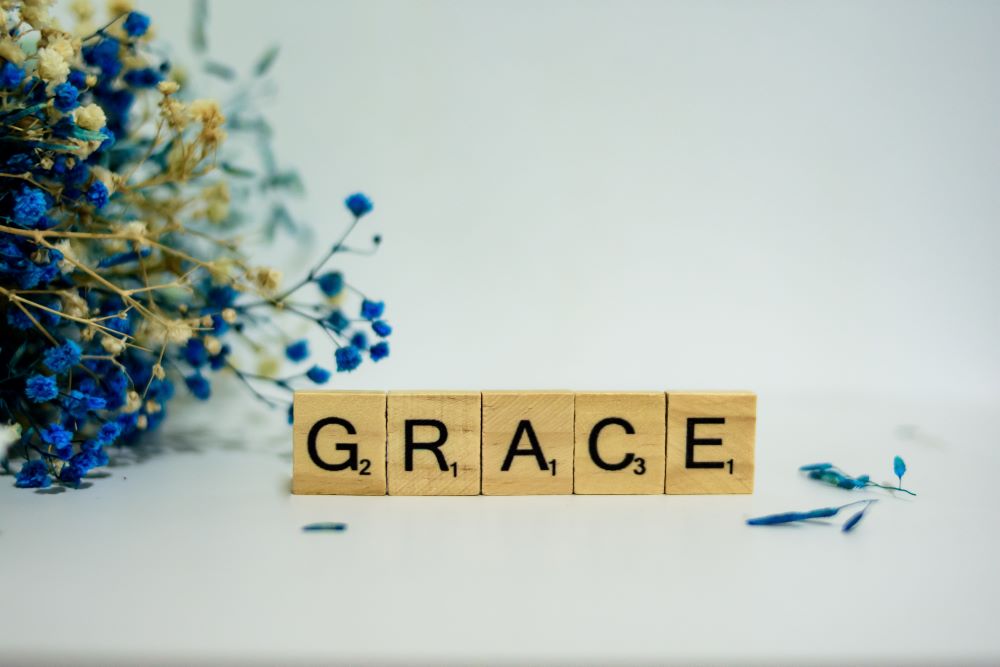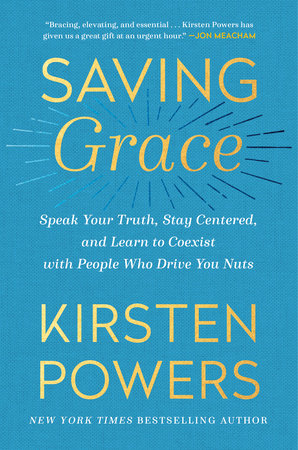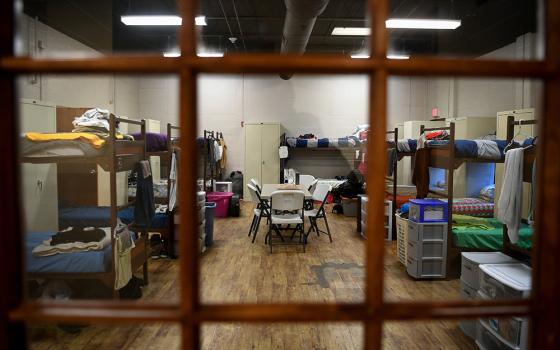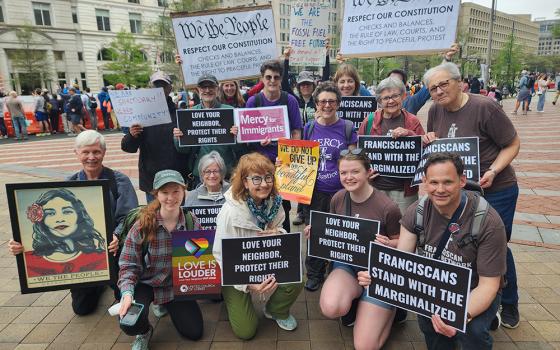
(Unsplash/Alex Shute)
Editor's note: Excerpted from Saving Grace by Kirsten Powers. Copyright © 2021 by Kirsten Powers. All rights reserved. No part of this excerpt may be reproduced or reprinted without permission in writing from the publisher.
Grace is what makes human coexistence possible.
Every thriving relationship in history — between friends, family, communities and countries — has been saturated with grace. Grace is what lets us stumble, fall, get back up and try again. Grace is what welcomes you back after you have failed someone or failed yourself.

Grace is what the Franciscan priest and writer Richard Rohr calls "the 'x' factor." It knits families, friendships and countries back together after betrayal, hurt and even violence. It's the father running to embrace the prodigal son when he's starving, penniless and drenched in shame. It's refusing to reduce people to the sum of their worst actions. We see it in the humility of the utterance "There but for the grace of God go I."
True grace is otherworldly. It goes against every instinct we have to seek revenge for wrongs or to shame and humiliate people who have acted immorally or unethically. It is what the theologian Dorothee Sölle, who grew up in Nazi Germany, called "borrow[ing] the eyes of God." It enables us to see the divinity in every person, no matter what they've done, what they believe or who they voted for. Grace is giving other people space to not be you.
Grace is the original self-care. It shushes the hectoring inner critic that tells us we are too much, too little, too fat, too thin, too good, and not good enough. Grace invites us off the hedonic treadmill of relentless achievement and success, which never delivers the happiness it promises. Grace doesn't care what size your waist is and celebrates every new wrinkle as evidence of wisdom earned. Grace shrugs at your unachieved New Years' resolutions and teaches you to be kind to yourself, just because. Grace reminds you of the "love yourself" part of Jesus' command "Love others as much as you love yourself."
Advertisement
Grace is amazing.
It's the sweet sound that cracks open a hardened heart. It smooths the edges of rough regret about the things we did and the things we failed to do. It gives us permission to accept that we were doing the best we could with the information we had — or as Maya Angelou said, "You did ... what you knew how to do, and when you knew better, you did better." Grace tills the ground so that peace, wholeness and completeness can take root in our burdened bodies, relationships and the world.
Reduced to its absolute essence, grace is "unmerited favor." In the Christian tradition, it's what God gives us free of charge. But in a country that fetishizes accomplishment, tells people they can "hustle and grind" their way to worth and fancies itself a meritocracy, many — like the prodigal son's older brother — are offended by the idea that other people would get something they haven't earned.
Practicing grace, in other words, can be really freaking hard. It’s something we love to receive, but often the last thing most of us want to offer. Instead, we incline ourselves toward what the author Philip Yancey calls "ungrace," withholding that which the world desperately needs. We become the prodigal's older brother glowering in the background, jealous and fuming about how undeserving his younger brother is of his father's reflexive affection and forgiveness.
Ungrace has become the lingua franca of our discourse. More often than not, it's the lens through which we view people who don't share our religious, political or moral values. Those people may be our leaders, co-workers, neighbors or, increasingly, members of our own families.
"Our lack and misunderstanding of grace and shrunken capacity to give grace is one of the things that makes the world such a brutal place," Lisa Sharon Harper, the writer and antiracism leader, told me in late 2020. "Discernment is necessary. Judgment is vanity."
Yet our mortal daily bread is to sit in judgment of "bad" people, to call out those who hold "bad" beliefs, and to punish people who have done "bad" things. This is what the "good guys" do. Doing so makes us feel strong and righteous, like we are on the side of the angels.
Until it doesn't.
"We will learn to live together, cooperate with one another, and recognize the dignity of others, or we will perish," wrote former president Barack Obama in his 2020 memoir, A Promised Land.
The stakes for us really are that high, both personally and as a country.
Perhaps the greatest surprise about grace is that while our practice of it benefits other people and our communities, the greatest beneficiary of it will be us.
All around Washington, D.C., where I live, yard signs reading "hate has no home here" began to crop up in 2017. Donald Trump's name didn't appear anywhere in the design, but the message was an obvious reference to the president and his followers. A longtime friend, a moderate Democrat who is one of the most even-tempered people I know, joked to me that at his lowest point he felt like posting a sign that read, "Hate has a home here," giving voice to a shared rage about what Donald Trump had wrought in this country.
My friend was worn out, and so was I. I was emotionally exhausted, frustrated and angry a lot of the time, like so many others around me. I was hearing more and more, "I can’t live like this anymore." The fractures were compounding, and people were finding themselves estranged from others who were important to them. If this agitation, fear and rage had been helping anyone or any causes I cared about, perhaps it would have seemed worth it. But it wasn't.
"Let no man pull you so low as to hate him," Booker T. Washington once warned. Well, I went that low. And then some. On good days, I could limit my negative feelings about those who I felt were causing so much harm to mere disdain. On the worst days, I hated their guts. But feeling hate, like being unforgiving, is tantamount to drinking poison and waiting for the other person to die. It only deepened my misery.
Reluctantly, I had a dawning awareness of just how devoid of grace our culture was. My initial attitude was "Save grace for the saints." My temperament is much more Joan of Arc than Jesus. I'm more inclined to saddle up and go to war to protect my people than to turn the other cheek or love my enemies.
What makes finding grace for others feel so impossible is that we are usually called upon to offer it when confronted with someone who has deeply threatened our sense of right and wrong. Grace exists especially for the person who we may feel is uniquely unworthy of it, who has done or said something repulsive or harmful to us and who in some cases we're still bound to dislike. But because it is unmerited favor, if we can come up with a reason why a person deserves grace, then it's probably not grace. "Loving is not liking," as Richard Rohr likes to say. So it is with grace. And yes, it can often be as hard as it sounds, but as I learned it's an effort worth making.
What I came to realize about grace is that many of us have a lot of confusion and misconceptions about what the word actually means. Just as important as describing what grace is, is naming what grace is not.
Grace is not rolling over and being a doormat; it's not a tool to excuse harmful behavior or defend the status quo. Grace doesn't demand you check your passionate beliefs or personality at the door. You still get to have big emotions and strong opinions and throw a serious side-eye when it's needed. You don't have to ditch your dry sarcasm or devastating wit. Grace creates space for all of us.
Perhaps the greatest surprise about grace is that while our practice of it benefits other people and our communities, the greatest beneficiary of it will be us. Grace is first and foremost a matter of the heart. It's an orientation toward the world and other people that keeps us from going down the road of judgment and labeling which in the end harms us more than anybody else.
"You can’t solve a problem with the same consciousness that created it" is a quote often attributed to Albert Einstein. What he seems to have actually said, in regard to the development of atomic weapons, is "We shall require a substantially new manner of thinking if [humanity] is to survive." Both formulations capture the essential task before us: in order to practice grace, we need a new way to think about the world, each other and the challenges we face.
The goal of grace is not to erase differences. Rather, grace helps us navigate those differences while honoring the humanity of others and ourselves.
My new book, Saving Grace, is about precisely that: unlearning many of our ingrained ways of being, those that fuel the toxic levels of ungrace in our culture. It's about understanding how to stay grounded in the midst of the tornado; speak your truth without spitting contempt; and coexist with people you don't even want to share a planet with, let alone a country. Coexist means different things to different people — for me, and this book, it denotes living in peace with people you'd very much like to vote off the island. It's a society that rejects physical, psychological, emotional, cultural and verbal violence.
The late civil rights icon and congressman John Lewis offered illumination of this pathway when he wrote in 2012: "Choose confrontation wisely, but when it is your time don't be afraid to stand up, speak up, and speak out against injustice. And if you follow your truth down the road to peace and the affirmation of love, if you shine like a beacon for all to see, then the poetry of all the great dreamers and philosophers is yours to manifest in a nation, a world community, and a Beloved Community that is finally at peace with itself." Such a vision of our future can seem fantastical in the current environment, until we remember that John Lewis's wisdom was forged in the fiery struggle for freedom and equality in the Jim Crow South.
The extreme level of division in this country is causing misery for many of us and dysfunction in our government. But the goal of grace is not to erase differences. Rather, grace helps us navigate those differences while honoring the humanity of others and ourselves.
"Grace is to live in the possibility of what does not exist," Yale theologian Dr. Willie James Jennings told me in an interview. "Grace means that you can actually look at the other person recognizing that there's not only things that you don't like — but there’s things that you hate — and still ask yourself: can I be open to the possibility that something can be created where there's nothing right now?"
Even trying to see this possibility can seem like a bridge too far. We feel like a nation on life support, gasping for hope. In the near term, we just need to take it a day at a time. For some people, moving from hatred to neutrality would be a victory when it comes to how they feel about ideological or political foes.
But I think most of us realize on some level that we are made for more than the way we are living right now. The vision that Congressman Lewis cast causes a deep stirring in us because we long for a more transcendent existence that recognizes we are all interconnected, woven together by our humanity, whether we like each other or not. A life of purpose is one that seeks to create a Beloved Community — a just and equal society based on the love of one’s fellow human beings, as articulated by Rev. Dr. Martin Luther King Jr.
I think we can — and in fact yearn to — go in a different direction than our narrow impulses often take us. We are ultimately meant to enter into what Dr. Jennings calls "the thickness of grace."






